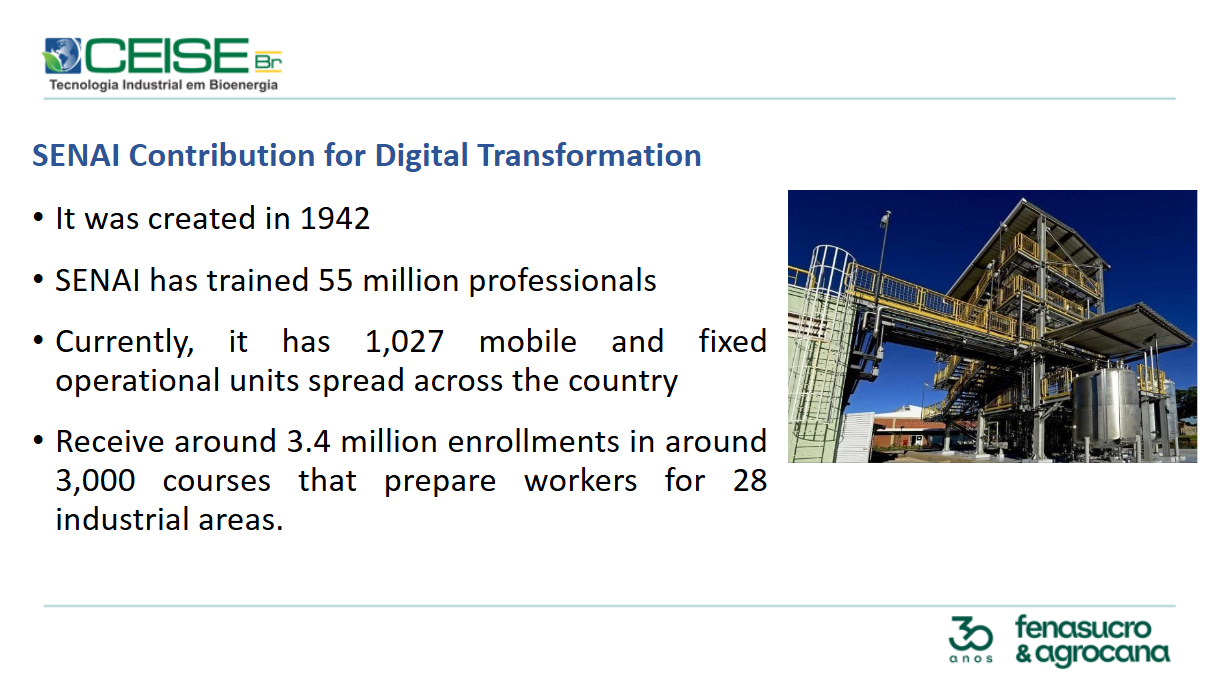
Nova Industria Brasil Facilitates Digital Transformation
By: Sharada Prahladrao
For the very first time, SMAR participated as a Global Sponsor at ARC Advisory Group’s 22nd India Forum titled Accelerate Transformation in the Age of AI, Open Automation, and Sustainability (July 10-11, Bangalore). In his presentation, Libanio Carlos de Souza, CEO, Nova SMAR discussed how Nova Industria Brasil is aiding the sugar-energy and biofuels sector in Brazil through digital transformation and renewable energy initiatives. He spoke about the similarities between Brazil and India in the context of renewable energy and biofuels, the role of various organizations, and the government’s financial programs aimed at promoting sustainable and productive industrial practices. This blog captures the key points of his presentation. The video can be viewed here.
The Background
Libanio is also the vice president of CEISE Br, founded in 1980 and headquartered in Sertãozinho, Sao Paulo. CEISE helps the sugar, ethanol, and bioenergy sectors in Brazil. Brazil generates a significant portion of its energy from renewable sources, including biogas and ethanol, supported by government financial programs like Nova Industria Brasil. CEISE has established itself as an influential voice capable of articulating policy that directly impacts the production, regulation, and competitiveness of Brazilian industries. Its performance is marked by a proactive and strategic approach, which includes constant dialog with the government at the municipal, state, and federal levels.
Ethanol In Brazil
Speaking about the ethanol business in Brazil, Libanio said that biofuel models make up 85 percent of the light vehicle fleet in Brazil; 22 percent of anhydrous ethanol is added in the gasoline. In other words, the gasoline in Brazil has 22 percent of ethanol. And now the government has decided to increase the ethanol component to 27 percent. Nova SMAR, initially created to support ethanol companies, expanded internationally in 1989, establishing manufacturing in India with support from Baldota in Mumbai.
World Bioenergy Fair (Fenasucro and Agrocana)
In the 1980s, CEISE organized the first fair in Sertãozinho for the sugarcane and bioenergy sector. Since then, this fair has gained in popularity, facilitating technology and innovation sharing with over 400,000 professionals.
The Industry Academia Linkage
The industry-academia linkage is vital to improve the quality and employability of human resources and sustain the business.
Local Production Arrangement (APL): Sertãozinho's APL initiative supports the ecosystem of the sugar-energy industry, involving local government and educational institutions to enhance industry solutions.
Schools: FATEC (maintained by the state); ISI-FSP (maintained by the federal government); and SENAI a technical school.
SENAI’s contribution to digital transformation In Brazil can be seen in the graphic below:

Mission Statements of Nova Industria Brasil
Mission 1: Sustainable and digital agro-industrial chains for food, nutritional and energy security.
Mission 2: Resilient health-industrial economic complex to reduce SUS vulnerabilities and expand access to health.
Mission 3: Sustainable infrastructure, sanitation, housing and mobility for productive integration and well-being in cities
Mission 4: Digital transformation of the industry to increase productivity.
Mission 5: Bioeconomy, decarbonization and energy transition and security to guarantee resources for future generations.
Mission 6: Technologies of interest to national sovereignty and defense.
Emphasizing Missions 4 and 5
Libanio provided more details about Missions 4 and 5 as they are related to the areas that CEISE is involved in. Only 23.5 percent of industries in Brazil are digitalized; the government has set an ambitious target of 90 percent digitalization. To achieve this objective, the government is incentivising industries by providing loans at low rates of interest.
Mission 4: Further, he elaborated about SENAI 4.0 (a program launched by SENAI Institute) to support Brazilian industry to become agile and acquire the skills required by Industry 4.0. They have a mobile training center that goes around Brazil teaching industries how to apply those technologies. And together with SENAI Institute, they run a consultancy service.
Mission 5: CEISE is closely connected to this mission as it focuses on the energy transition and the bioeconomy in Brazil. “Collectively we are striving for a better world,” said Libanio.
Future Goals: Brazil aims to reduce carbon emissions by 30 percent and increase the share of biofuel in the transport energy matrix, with a focus on developing hydrogen-powered electric cars using ethanol cells.
O-PAS and Industry 4.0 Roadshow
At the ARC India Forum, SMAR hosted a roadshow “O-PAS and Industry 4.0” on July 10, 2024, from 2pm to 4pm at the SMAR booth. Industry participants got hands-on experience and SMAR got the opportunity to network and disseminate information.
This is the largest marketing program in the world to disseminate O-PAS technology. The plan is to initially hold 50 exhibitions across the globe. This was the 14th event hosted so far; and this year three roadshows have been held in partnership between Nova SMAR and ARC: Orlando-USA, Barcelona-Spain, and Bangalore-India.
During the Forum, Libanio announced the strategic partnership between Nova SMAR and WEG, a global leader in electro-electronic equipment, for development and applications with O-PAS technology.
Libanio’s Views during the Panel Discussion
Commenting on the role of Nova Industria Brasil in digital transformation, Libanio said that the entire world is competing to increase industrial productivity and for that digital transformation is very important. The Government has taken the initiative to help and provide guidance. Brazil needs to improve its exports too. Agro business is very strong in Brazil, but they want to improve and get a bigger piece of the international market.
https://www.arcweb.com/blog/nova-industria-brasil-facilitates-digital-transformation
Latest news
-
Nova Smar participated in the 22nd Visão Agro Award in Ribeirão Preto
-
Nova Smar participated in the 8th UDOP Seminar on Innovations
-
2025 Annual Sales Conference held in Sertãozinho
-
Nova Smar participated in Mossoró Oil & Gas 2025
-
Employees of the Rio do Cachimbo Distillery underwent training at Nova Smar
-
Winston Churchill State School visits Nova Smar
-
Nova Smar participates in The Open Group Summit in Houston, Texas, USA
-
Dalmaso State School visits Nova Smar
-
Brava Energia participated in HFC 302 training
-
Nova Smar participated in Fenasan 2025







